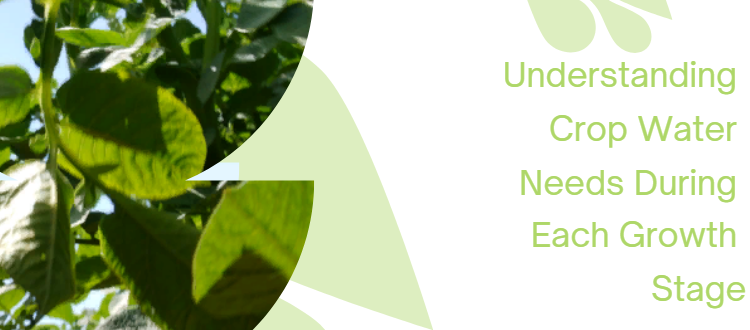#Agriculture #Irrigation #CropGrowth #WaterManagement #Farmers #SustainableAgriculture #CropHealth #YieldOptimization #AgriculturalPractices
The water requirements of crops vary significantly at different stages of their growth cycle. During the initial stages, such as emergence and early growth, crops are particularly sensitive to water stress. Daily water requirements increase rapidly from the time of emergence through approximately two weeks after row closure. Adequate water supply during this phase is crucial as it sets the foundation for the crop’s future development.
One of the most critical stages to avoid moisture stress is during tuber initiation (GS 3). At this point, the crop’s yield potential is determined, and any water deficiency can significantly impact the final harvest. Providing sufficient water during tuber initiation is essential for ensuring healthy and robust tuber formation.
Tuber bulking (GS 4) is another pivotal growth stage. Moisture stress during this phase can lead to reduced tuber size, misshapen and cracked tubers, and increased susceptibility to diseases. Farmers must carefully manage irrigation during this period to optimize tuber development and prevent quality issues.
As the crop approaches maturity, typically during GS 5, the need for irrigation begins to decline. Overwatering at this stage can lead to problems like delayed skin firming and lenticel closure. Additionally, excessive soil moisture content increases the risk of diseases such as soft rot and pink rot, which can be detrimental to the crop’s health and market value.
Understanding the crop water needs during each growth stage has several positive consequences for farmers and growers. By providing the right amount of water at the right time, they can achieve the following:
Optimal Yield: Proper irrigation management ensures that crops receive the necessary water during critical growth stages, resulting in better yield and quality.
Resource Efficiency: By avoiding overwatering, farmers can conserve water resources, reduce irrigation costs, and promote sustainable agricultural practices.
Disease Prevention: Managing moisture levels helps minimize the risk of diseases caused by excess humidity, such as rot and other fungal infections.
Enhanced Crop Resilience: Adequate water supply during early growth stages improves crop resilience, making them better equipped to withstand environmental stressors.
Economic Benefits: Maximizing yield and quality translates to increased profits for farmers and a more stable food supply chain.
Understanding crop water needs during each growth stage is vital for successful crop management. By carefully considering and optimizing irrigation practices throughout the growth cycle, farmers can enhance their yields, resource efficiency, and overall crop health.
Source: Australian Potato Growers







